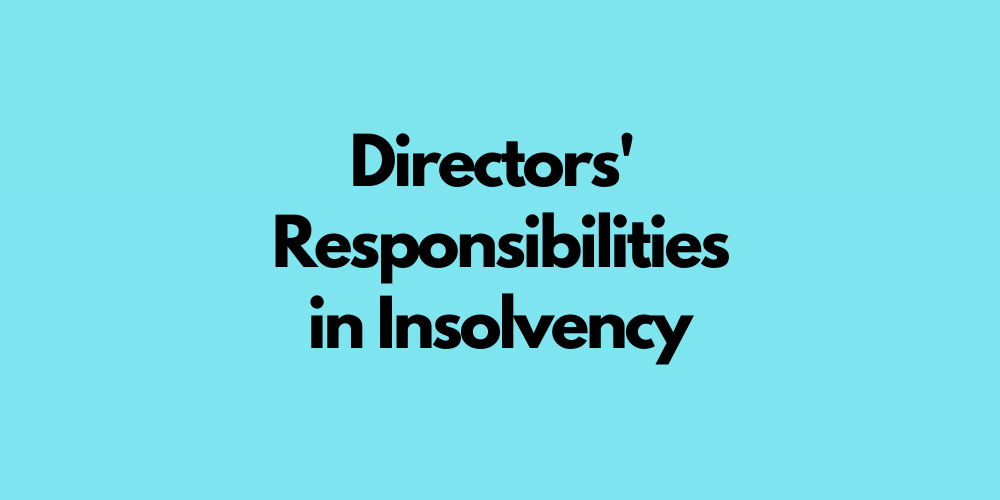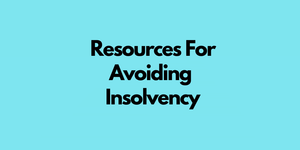Directors Responsibilities in Insolvency

Introduction: Directors play a critical role in company insolvency.
For directors of a UK limited company, the liability for the company's debts is limited as long as they have acted appropriately and on time. Also, if you've been compliant and on the payroll for many consecutive years, then you can claim redundancy from the government just like any employee.
But when you fail to act in time, fail to act reasonably, fail to keep books and records, continue taking credit, KNOWING that your company cannot fully repay the debt, you're at high financial risk and may even lose all your possessions. So, act now and get help for your company and, most importantly, begin reducing your own risks.
The event described above may be considered wrongful trading; if a liquidator can establish there was wrongful trading, you are at greater personal danger. It could trigger you personal liability for business debts. A classic example of wrongful trading is collecting funds from suppliers or collecting deposits from customers when you think that you cannot pay.
Duties in relation to insolvency:
1. Duty to act in the interests of creditors:
When a company goes bankrupt, the interests of its creditors are paramount. The company's directors have a duty to act in the best interests of its creditors and to ensure that its assets are fairly distributed among them.
This includes taking steps to ensure that the company's assets are not squandered or hidden from its creditors. If the directors fail in their duty, they may be held liable for any losses suffered by the creditors. Insolvency is a term that is used to describe the situation when a business can no longer pay its debts.
This can happen for a number of reasons, including financial difficulties, legal issues, or simply because the company's resources have been depleted. In order to avoid insolvency, directors are responsible for ensuring that the business is managed in a way that will prevent it from becoming insolvent.
2. Duty to prevent wrongful trading:
When a company is on the verge of collapse, its directors have a duty to take steps to prevent wrongful trading. This includes taking into account the interests of creditors and shareholders, and not allowing the company to continue trading while it is insolvent. Directors who allow their company to trade while insolvent can be held personally liable for any losses suffered by creditors.
3. Duty to disclose information:
In any professional relationship, there is a duty to disclose relevant information. This includes both personal and professional relationships. In most cases, the duty to disclose is clear, but in some situations it can be more complicated. For example, if you have a personal relationship with someone who is also a client, you may need to disclose that information to your supervisor. You may also need to disclose information if it could impact your ability to provide professional services.
5. Duty to refrain from acting improperly when your limited company is trading whilst insolvent:
When a company is insolvent, its assets are marshalled and sold to repay its creditors. This process is overseen by an appointed administrator who is charged with marshalling the company's assets and distributing them equitably among the company's creditors. Creditors have a duty to cooperate with the insolvency administrator in order to ensure a fair distribution of assets. This includes providing information and documents requested by the administrator and consenting to any actions taken by the administrator in order to realise the company's assets.
The following is commonly referred to art experts as the "lifting of the veil of incorporation" that shields escape artists from liability. In this context, the sort of activity takes on critical importance. If you happen to partake in this, you may be held responsible for the income taxes owed, VAT refunds, and bankruptcy liabilities you could have known about ahead of time.
Directors who violate Company Directors Disqualification Act 1986 may be suspended from office for up to 15 years, they can be fined, and may face the loss of their property and personal assets, including their home.
4. Duty to cooperate with insolvency administrators:
In the event of company insolvency, directors have a number of responsibilities to ensure that the creditors and shareholders are protected. Directors must identify and assess the company's assets and liabilities, make decisions about how to distribute assets, appoint administrators or trustees to take charge of the business, and cooperate with bankruptcy court proceedings. Directors who fail to carry out their duties can be held liable for damages incurred by creditors or shareholders.
5. Duty to refrain from acting improperly when your limited company is trading whilst insolvent:
In the event of company insolvency, directors have a number of responsibilities to ensure that the creditors and shareholders are protected. Directors must identify and assess the company's assets and liabilities, make decisions about how to distribute assets, appoint administrators or trustees to take charge of the business, and cooperate with bankruptcy court proceedings. Directors who fail to carry out their duties can be held liable for damages incurred by creditors or shareholders.
6. Protection from personal liability when your UK Limited Company is declared insolvent:
When your UK Limited Company is declared insolvent, you may be protected from personal liability. This means that you will not be held responsible for the company's debts and liabilities. There are a few things that you can do to protect yourself from personal liability, including: setting up a limited company bank account, appointing a director, and creating a shareholders agreement. If your company is declared insolvent, make sure to contact an attorney who can help protect you from personal liability.
7. Conclusion: Director's responsibilities when a UK company is placed into liquidation
When a UK company is placed into liquidation, the director's responsibilities are to:
- - act fairly and in good faith towards the company's creditors;
- - ensure that the company's assets are realised as quickly as possible and for the best price available;
- - co-operate with the liquidator in order to realise the company's assets; and
- - disclose all information relevant to the liquidation.
8. Simple & Low Cost Alternative to Liquidation
While you may have been a director for a long time, you may not have realised that your conduct breaks the law. Now you know, an Insolvency Practitioner would no doubt tell you that 'you need to act quickly to take measures to protect yourself as a director, for example, able to work quickly to stop trading, and put the company into compulsory liquidation; or consider a company liquidation procedure if your business is still able to do so.
However, there is a simple and low cost alternative to insolvency for your UK limited company.
You can legitimately sell your business to a third party, along with all the business' debts and liabilities. It's fast, easy and very low cost when compared to liquidation, bankruptcy and insolvency.




